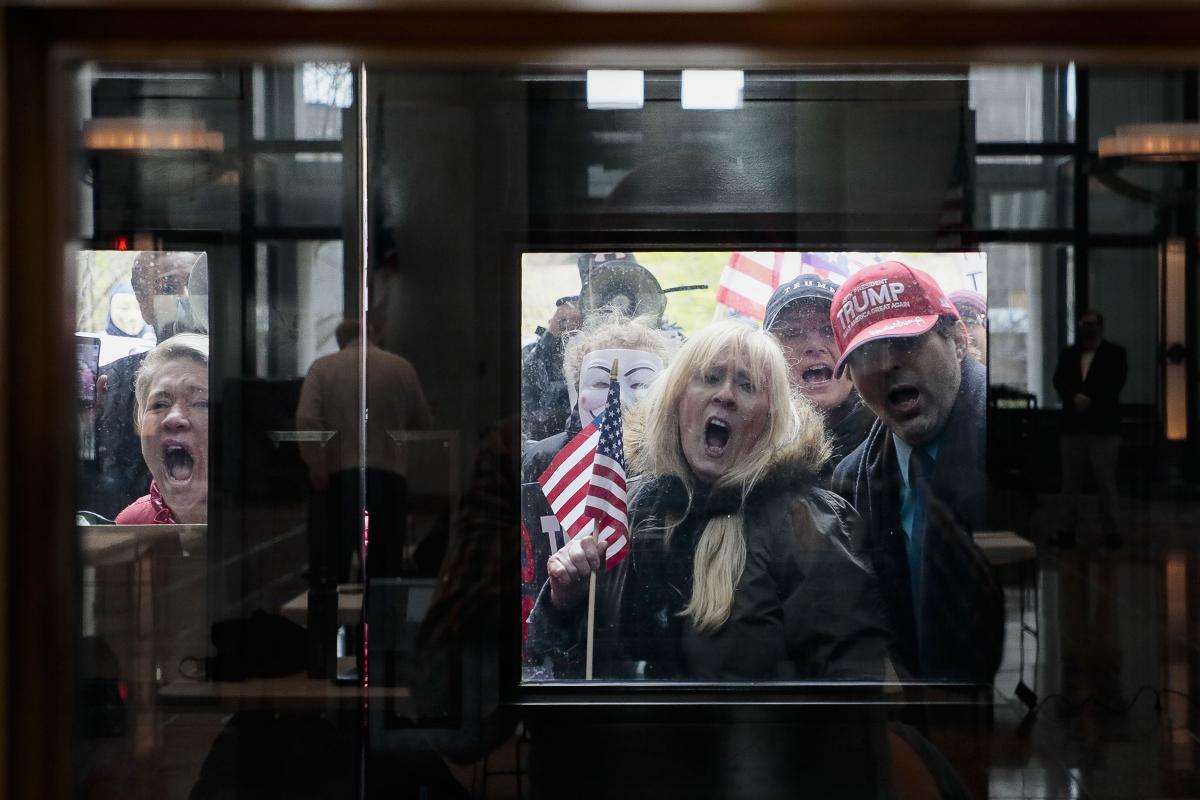
"What I think is so affectively charged about the present moment and feels so profoundly distracting...I think it's that we are in this situation where a field of possibilities has opened that is, on the one hand, really seeming to propel us even deeper into the hole, and then, on the other hand, there are these little moments where a vista of something else opens up."
Photo: The Columbus Dispatch photo of an anti-social-distancing protest in Ohio. (Joshua A. Bickel/AP)
The last time I spoke with English Professor Eva Cherniavsky was in October, when we were filming the “Neoliberalism” video for Keywords, in which she discussed how zombie apocalypse narratives offer us a lens through which to think about the logic of neoliberalism. Since then, we’ve found ourselves in a pandemic that many are comparing to their favorite zombie films, comics, and novels.
Listening to Cherniavsky’s prescient observations about how zombie apocalypse narratives reflect and refract the logic of neoliberalism, I was struck by how much they resonated with our current moment. She kindly agreed to jump on Zoom and chat a bit further about how her work might help us think through the peril, politics, and possibilities of Covid-19.
A lot of people have been talking about the pandemic in relation to zombie apocalypse narratives, which is something you’ve been thinking and writing about for two decades now. How have you been thinking about our current moment in relation to the work you’ve done?
It’s really been making me think about the different iterations of zombie narratives in the genre. There is a really bleak one, where the zombie apocalypse happens, the dead rise, civilization collapses and yet it turns out that the collapse of civilization delivers us right back into a world of hyperbolic survivalist individualism. The collapse of organized social order just sort of catapults into a neoliberal nightmare of every man for himself. Jane Eliot has written about this in really interesting ways, she calls it the microeconomic mode: my survival depends on your demise. It’s always about the cost-benefit analysis. It's about hoarding. It's about necropower. That’s one version of the zombie apocalypse narrative that, in my darker moments these past few weeks, I've thought about.
But even as the economy shuts down, here we are in this moment where the air is breathable again. We actually walk in a quiet city breathing breathable air. There are these pastoral interludes at the same time that the shutdown seems to have exacerbated that sort of survivalist mode. I heard Arundhati Roy interviewed and she talked about the crisis as a portal, a moment of transformation that opens this field of possibilities.
Both of these versions are true. What I think is so affectively charged about the present moment and feels so profoundly distracting—the reason I can't turn off my news feed, I can't look away, everybody is talking about the difficulty of concentrating on anything—I think it's that we are in this situation where a field of possibilities has opened that is, on the one hand, really seeming to propel us even deeper into the hole, and then, on the other hand, there are these little moments where a vista of something else opens up.
Are there any specific examples that exemplify either of these versions?
There was a great picture of protesters in Ohio demanding that the government be reopened and they're behind a glass window and it looks like Dawn of the Dead. Just visually, the composition of the image—if you put the American flag in the shot of the zombies from Dawn of the Dead, that shot would be almost identical.
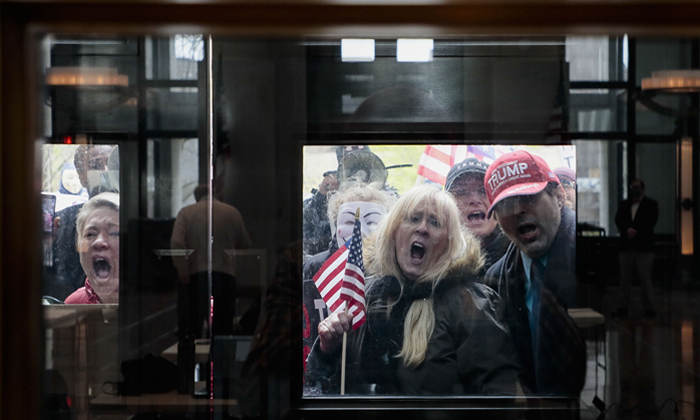
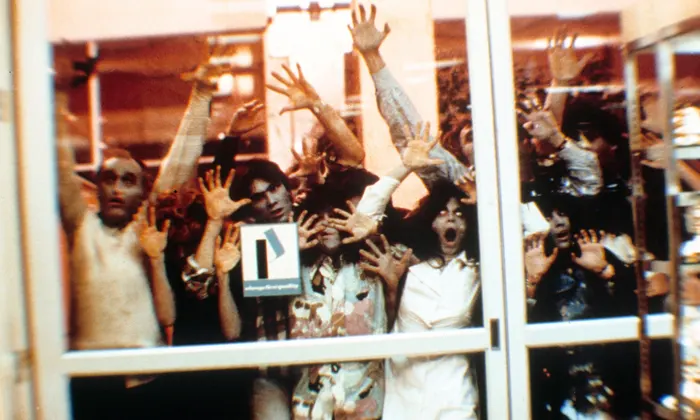
I find the protestors really interesting, because it exemplifies everything we said about neoliberalism in the video. It's a purely individual calculus. What they're saying is: I did the cost-benefit analysis and I'm likely to survive. There’s no obligation to any kind of larger social body or any notion of collective public health. Doesn't matter how many millions die, my chances are pretty good. There is no expectation that there is any kind of benefit to be gleaned from belonging in anything. It's just about: I need to go back to work to try to accumulate what I can accumulate.
But also, the protests reflect how the zombie is always a fundamentally ambivalent figure. If you go back to Haitian voodoo, the zombie was historically mustered as a threat on the part of plantation owners, saying: don't kill yourself, because if you die, I’ll just resurrect you and you will be my slave forever. So, on the one hand, the zombie is this eternal slave and, on the other hand, a figure of insurrection. The zombie masses are always on the march, overpowering, consuming, undeterrable, no boundary can hold them. That sense of doubleness follows the zombie through its successive popular cultural iterations and I think there's something similar to me at play in those moments of protest. It’s always unclear whether the zombie horde on the move is transformative. There's a certain romance of the zombie horde as the insurrection of the masses. But it also always risks becoming an insurrection that simply reproduces the logic of the power that was exerted against it. It’s often the case that the zombie horde can only ever wield the power of death and destruction that was leveraged against it in the first place.
That's some of the logic that I see when I see the protests to reopen. On the one hand, it is a political protest. In that sense, it always carries with it some kind of demand of agency and some kind of claim to self-determination. But on the other hand, it’s a form of protest that simply seems to reproduce the world in which they’ve been instrumentalized. To go out and protest to be allowed to go back to what are, we can assume, insecure jobs with inadequate wages, inadequate retirement, inadequate health insurance—to see people marching for that and at the risk of their lives, literally?
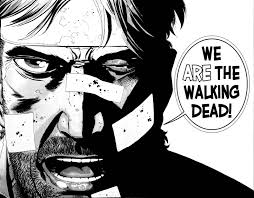
It reminds me of a really famous moment in The Walking Dead comic where some of the survivors are talking about reinstating civility and how they're going to rebuild a community. One of the leaders of the group says “don't you get it? That ship has sailed.” He then gestures to a sea of zombies surrounding them as they're talking and says, "Don't you understand? We are the walking dead.” That’s what I kept thinking when I saw those protestors: we are the walking dead.
Another issue that came up in the Keywords video, which I think gestures to the point about this pandemic being a portal, is how zombie apocalypse narratives can act as an imaginative space for thinking about forms of collective action that push against what can feel like the inescapable logic of neoliberalism. Is there a way zombie apocalypse narratives can help us think about what possibilities might be created in this moment?
Yes. So, there’s the hard right, neoliberal version of the necropolitical overlord hoarding his supplies with an army of thugs to protect it and then there’s the more benevolent version, which I think of as the “civil gated community” version—like we're a happy community, but, of course, we have walls and we're going to be very careful about who comes in. So there are different flavors, but I’m really interested in those moments where characters sometimes individually and sometimes in small groups, refuse both those logics. They put down arms. They no longer understand zombies as worthless because they’re already dead. They go against the logic of the typical zombie movie, where you march through the horde and leave a sea of “dead” zombies in your wake—those moments, where instead of killing zombies, the protagonist lays down arms, walks outside of the fortification, and actually imagines ways of living alongside and moving alongside the zombie. And if you think about the way in which the zombie is only ever the politically abject version of ourselves, I actually think that's a really interesting moment for trying to imagine alternative forms of agency, alternative ways of moving in the world that don't depend upon self-possession, that don't depend on a logic of property, that don't depend on a logic of sovereignty.
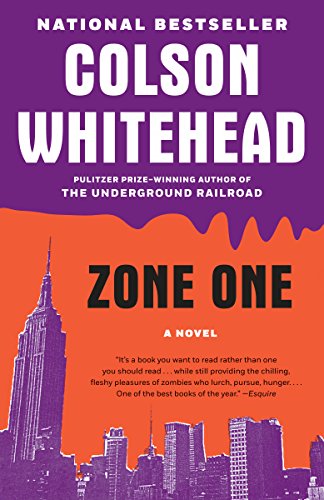
That's really what I'm interested in. I've decided that the book I'm writing is really trying to go through and curate a kind of ensemble those moments and see what it yields. The signal for me is really at the end of Colson Whitehead’s novel, Zone One, where, for the protagonist, the zombie outbreak is really just a new opportunity for disaster capitalism. At the end, you see him walk out the door and the final phrase is, “he walked out into the sea of the dead.” It’s not a utopian moment, it’s not a dystopian moment. It’s that moment where you wonder if he can really survive. It’s difficult to imagine, but it’s a moment of possibility and it certainly seems more affirmative than everything that has gone on before.
I also find it fascinating that people are turning to zombie apocalypse narratives and their authors for advice on how to survive the current pandemic, which is something you mentioned in Keywords—that people actually read zombie apocalypse narratives as survival guides.
Yes, in fact, the CDC, early on, was actually using zombie narratives as educational tools for emergency preparedness and good public health practice—like advising people to stay away from others, to stock up on toilet paper and water. Which is so funny, because the zombie apocalypse narrative is already a refraction of that kind of logic, of our current moment. Everything reduces to cost-benefit analysis. Optimize your conditions! To see it recursively as public health advice is mind blowing.
There was a moment early on in this, when I went to the QFC and there was a woman with an entire shopping cart loaded with bottled water. It must have been 150 bottles of water. My first thought was: first of all, I don't think the water is going to stop flowing. I'm fairly certain that the this is not an earthquake, it's a virus that won’t shut down the water. But it was the epitome of the zombie apocalypse logic at play.
Something else I’ve been thinking about is the function of the state in zombie apocalypse narratives and how it relates to the dysfunction of the state right now in terms of responding to the pandemic.
So, in the zombie apocalypse narrative, it’s usually an event that happens overnight. There's this overwhelming event that occurs, the dead rise and everything blows up. And yes, there is a sense in which, as I was saying earlier, the dissolution of society seems to throw us into a hyperbolic version of the very social relations that have allegedly been dissolved. But our own moment has a very different temporality—it’s very slow and what it seems to be doing is revealing the state that we were already in. That the healthcare system was failing before. 40% of Americans didn't have $400 in the bank before.
With the interesting exception of Colson Whitehead’s novel, where a very neoliberal kind of corporate state is briefly resurgent through a reconstruction effort, in most cases, the thing that disappears is the state with the exception of certain things that persist. Typically, they're remnants of the military, like armed groups. But it’s almost invariably about imagining much more localized or ephemeral forms of power.
But right now, it’s not the case that state is receding. It’s simultaneously absent and over present at the level of the military and carceral institutions. The apparatus of the police-state is over present. It’s over present as an indemnifier of markets. So that’s part of the problem. On the one hand: who do you appeal to other than state to exercise a concern for general welfare? And then what do you do with the fact that that the repressive state apparatus is alive and well?
That’s distinct from the zombie apocalypse narrative, where the state just vanishes. You have to worry about necropower and various groups wielding terror and violence as a strategy of power and accumulation, but it’s never a state.
